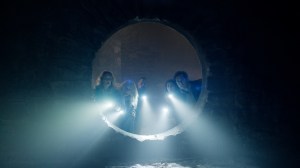The Lord of the Rings: The Rings of Power Season 1 concluded with its first season finale episode on Friday, “Alloyed.” Reviewing the first two episodes of Prime Video’s saga set in the Second Age of Middle-earth, I expressed a middling opinion. It seemed like a well-produced show with some good ideas, but there was a listlessness in its reliance on mysteries over adventure to drive its story forward. However, throughout its first season, The Rings of Power surprised me with some of its plot beats and endeared me to several of its characters as it gave us the origin stories for Mordor, mithril, and more.
Videos by ComicBook.com
Now that The Rings of Power has revealed Sauron’s identity and confirmed the Stranger’s nature, I’ve found myself thinking about what worked for me in The Rings of Power‘s first season and what didn’t, starting with the season finale, which seemed a rushed affair. While I don’t object to the events of the finale, they felt crammed into the episode, the televised equivalent of someone writing their letters too large on a sheet of paper and having to write smaller towards the edge. Several single scenes seemed like they should have been two. More jarring is the entire seduction of the Elves and forging of the Three Rings occurring in the finale felt hurried after seven episodes building Halbrand’s mystery (though the episode’s co-writer reminded us that there are more Rings to be forged).
Speaking of Sauron, while his secret identity wasn’t an unsolvable mystery, the idea of a repentant Sauron (present in Tolkien’s writing) is interesting. The question is whether Sauron’s penitence is genuine or part of his manipulations. The Rings of Power deliberately leaves this open to interpretation, but to my reading, the reveal works if Sauron is sincere. Galadriel was correct to aid Halbrand even if he did turn out to be Sauron. To be willing to help lift fallen souls toward the light is part of the burden the heroes of Middle-earth bear. Galadriel’s bonding with Halbrand over their shared relationship with the “darkness” is similar to Frodo’s connection with Gollum over the One Ring’s corruption. However, if Sauron has been playing Galadriel, the desire to redeem the fallen becomes a weakness ripe for exploitation. That’s far less satisfying and less in line with Tolkien’s themes than Sauron learning all the wrong lessons from his relationship with Galadriel.
But then Galadriel has lessons to learn for herself. One of the most shocking moments in the entire season came when Galadriel brazenly proclaimed her intent to wipe Orcs from the face of Middle-earth. Adar’s plea that his children have the same spark of the Sacred Fire as any other being on Arda fell on deaf ears. It’s surprising to see The Rings of Power tackle the depiction of the Orcs in Tolkien’s writing, something Tolkien himself tried and failed to reckon with in his lifetime. Based on the end of the finale, it seems that Sauron will go to the newly created Mordor and exert his power over the Orcs there. Much will depend on the arc’s execution, but giving Mordor this history as an Orc sanctuary only to be corrupted by Sauron adds a sense of tragedy usually reserved for Middle-earth’s Western kingdoms. It adds something to Modor and the Orcs’ that makes them more than just the hordes of the East.
Next to the Orc storyline, the events in Khazad-dûm are easily the other highlight from this season, but for different reasons. The origin of mithril is fine, but the friendship of Elrond and Durin is what shines brightest. Played brilliantly by Robert Aramayo and Owain Arthur, these two have warm chemistry that is absent from the rest of the show. There’s joy in those Dwarven halls, and seeing Moria in its glory is a special treat for Lord of the Rings fans.
But for all the bright spots, some things worked less well. The Rings of Power tried to create its own Helm’s Deep with the battle against the Orcs in the Southlands. The episode is fine, but inviting that comparison was always going to put it at a disadvantage and make it look small compared to what Peter Jackson and company were able to do on the big screen. Halbrand’s line about his knowledge of alloys being a gift, a reference to Sauron’s Annatar, the Lord of Gifts disguise in Tolkien’s writing, comes off as patronizing, an Easter egg to show that the writers did their homework. For all that time the show spent in (well-realized) Númenor this season, it feels like the island nation’s story hasn’t even begun.
And then there’s the reliance on mystery, one of my initial qualms with the series. The Rings of Power is hardly the first series or even the first show based on a popular intellectual property to fall back on mystery boxes (and, to a lesser extent, melodrama) to take on the now standardized X-hour-movie-as-streaming television-show format. But it’s hard not to question their viability in The Rings of Power. Many viewers guessed Sauron’s identity and the Stranger’s nature long before the big finale reveals. While the Stranger is still unnamed, he is giving off such strong Gandalf vibes, even down to Daniel Weyman’s speech and mannerisms being reminiscent of Ian McKellen’s, that it would be hard not to cry foul if he turns out to be anyone else. And as for Isildur’s fate, we already know what that is, so The Rings of Power‘s writers need to have a seriously compelling story arc in mind for its second season to justify acting like that show is unaware.
Years ago, I wrote that I felt it was time for someone to do something new with Tolkien’s fantasy world for film and television. The Rings of Power seems to be doing that, and I have no quarrel with the liberties it’s taken with the history of the Second Age. But the show could stand to learn some discipline and focus in its pacing. It could better balance Durin’s warmth and humor with Galadriel’s angst-ridden severity and offer more of that sense of adventure that defines Middle-earth’s most famous stories instead of largely empty mystery boxes. And yet, it took some big, fascinating swings in its first season, from expanding on the Orcs to explaining Gandalf’s (we assume) fondness for Hobbits and showing a new side of Sauron. While the show is not with its failings, I’m fascinated by The Rings of Power and eager to see where it goes next.
The Lord of the Rings: The Rings of Power Season 1 is streaming now on Prime Video. Season 2 is in production.








